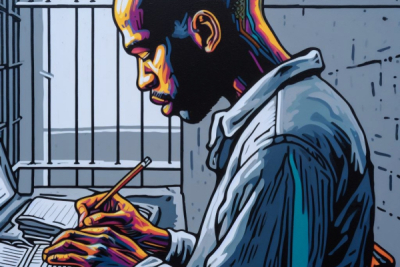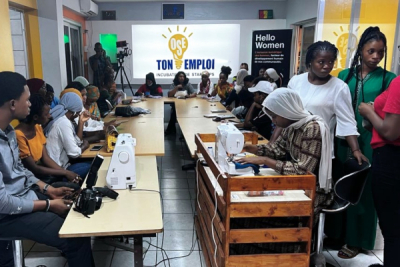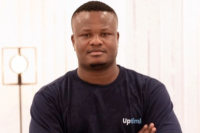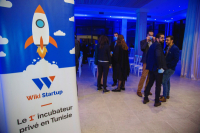With this orbiting, Djibouti has joined the exclusive group of African nations with satellites in space, alongside Kenya, Zimbabwe, Egypt, Uganda, and Angola.
The Republic of Djibouti successfully launched its first satellite, Djibouti 1A, on Saturday, November 11, from the Vandenberg spaceport in California, USA. The satellite lifted off aboard SpaceX's Falcon 9 rocket.
"We have put in place all the necessary elements to succeed in this project: firstly the selection of Djiboutian students, because the objective was to make the satellite but not to buy it, and have it manufactured by our students to make this technological leap and say in an uninhibited way that Djibouti is capable of manufacturing a satellite, launching it, collecting results for the climate but also getting started in development perspectives. The result is that 10 technicians and engineers were trained," said Nabil Mohamed Ahmed, Djibouti's Minister of Higher Education and Research.
The new satellite is the result of collaboration between the Djiboutian government and Centre Spatial Universitaire Montpellier-Nîmes (CSUM) in France. In 2020, the Centre began training Djiboutian engineers who played a key role in designing, constructing, and testing the nanosatellite. Successfully passing vibration tests in March, Djibouti 1A was deemed launch-ready by July. This satellite, intended for space research and communications, will gather real-time national data from climatological and seismic stations. It aims to monitor variables like temperature, rainfall, river depth, and hydrometry, contributing to enhanced agricultural production and environmental change monitoring.
Samira Njoya
To accelerate their digital transformation, African countries are forging strategic partnerships. With this MoU, Rwanda wants to further develop its tech sector.
Paula Ingabire (photo, right), Rwandan Minister of Information and Communication Technologies and Innovation, and Mohammed bin Ali Al Mannai (photo, left), Qatari Minister of Communications and Information Technologies, signed an ICT memorandum of understanding on Thursday, November 9 in Kigali. The aim is to strengthen collaboration between the two countries in the fields of public key infrastructure and the formulation of information and communication technology policies and strategies.
"This collaboration is a testament to our commitment to promoting innovation and technological advancement on both local and international levels. [...] This partnership aims to strengthen synergy for mutual growth and development, fostering knowledge and resource exchange in various key areas of the information and communication technology sector," said Mohammed bin Ali Al Mannai.
Like many African countries, Rwanda is multiplying partnerships to ensure its digital transition, with the signing of memorandums of understanding with Kenya and Guinea earlier this year. Rwandan authorities have taken, several steps to strengthen their artificial intelligence, cybersecurity, and smart cities segments. The country is one of the best in Africa when it comes to digitization and it is establishing itself as a tech hub in the Great Lakes region.
Support for research and development in the field of artificial intelligence, exchanges of experience in digital transformation and e-commerce, cooperation in the field of smart cities, and cross-border data flows are other ICT segments covered by the memorandum of understanding signed.
Adoni Conrad Quenum
In the digital age, students need to access some tech tools. Unfortunately, in certain settings, this is challenging. In that context, South Africa is taking steps to provide some of those tools for its inmates.
The South African Supreme Court of Appeal has granted the government a 12-month deadline to formulate and promulgate an updated policy for correctional centers, enabling inmates to use personal computers in their cells for educational purposes.
Henceforth, an inmate enrolled in an accredited higher education institution requiring a computer for academic purposes will be permitted to use one without internet access in their cell.
"I observe that ever more educational materials are available in electronic form, and such materials are most conveniently and economically accessed on a computer. [...] Coursework is now routinely composed and submitted electronically. I have found that the right to further education includes the right to pursue that education. If a prisoner has a personal computer, it is a tool of indispensable value in the pursuit of many courses of further education, " said Judge David Unterhalter.
The decision to review the policy comes after a Johannesburg inmate, serving a 20-year sentence for robbery, complained that he was struggling to complete his computer course because he couldn't work from his cell, where he spent most of his time. Pending a review of the policy, the judge declared that the inmate has the right to use his PC in his cell as long as he remains enrolled at a recognized institution of higher or university education in South Africa.
However, the inmate must make the computer available for inspection at all times, and any breach of the rules by an individual inmate could result in the computer being seized.
Samira Njoya
Tourism, like almost every sector, is undergoing a major digital transformation in Africa. To successfully implement that transformation, some countries are teaming up with tech giants to support their strategies.
Patricia de Lille (photo, right), South Africa's Minister of Tourism, and Alistair Mokoena (photo, left), Country Manager of Google South Africa signed an agreement in Cape Town on Monday, November 13. The aim is to promote South Africa as the choice tourist destination and provide training and support in the sector.
"In an era of digital transformation, collaboration between technology giants and government entities has the potential to reshape industries and enhance public services. [...] This visionary partnership between Google and the Ministry of Tourism, focusing on non-monetary exchanges to leverage each parties’ strengths for mutual benefits," said Patricia de Lille.
This partnership is part of the Ministry's mission to improve the attractiveness of the sector, harness its technological power, and increase the number of tourist arrivals in the country to support economic growth and job creation. Google, the world's largest search engine, has several tools at its disposal, such as Google Arts & Culture, with which the Mountain View firm can highlight the country's tourist destinations, encouraging Internet users to develop a greater interest in South Africa. Startups operating in the sector can be supported by Google programs such as the Start-up Accelerator and the Black Founders Fund.
"As a company that prides itself in organizing the world’s information and making it universally accessible and useful, we look forward to rolling out various programs in conjunction with the department, to fast-track digital transformation in the sector, helping with digital skills and showcasing South African tourism through our Google Arts & Culture platform," said Alistair Mokoena.
Adoni Conrad Quenum
In recent years, a growing number of young Africans have embarked on the path of entrepreneurship. Most often they either want to create jobs for themselves and others, diversify businesses, or just innovate to address local issues. In Guinea, the incubator Ose Ton Emploi has set itself the mission to support them.
Ose Ton Emploi is an entrepreneurial support institution created in 2018 in Guinea by Danda Diallo, a young Guinean entrepreneur. The incubator stimulates entrepreneurial desire, encourages, mentors, and directs innovation efforts toward growth-generating sectors. It aims to create a new generation of entrepreneurs committed to the growth and development of Guinea Conakry.
The Incubator provides customized support to meet the specific needs and profiles of entrepreneurs. It establishes incubation programs and arranges training, coaching, mentoring, and networking sessions to enhance entrepreneurs' capabilities and streamline their access to funding, markets, and partners. Operating on an inclusive approach, it centers around the entrepreneur, valuing the diversity of sectors, regions, and genders.
In 2022, the incubator introduced a digital platform, specifically designed for youth training, named Sanku Lab. Funded by Orange Guinea, the platform's goal is to train 2,100 individuals in "digital professions, prototyping, and the manufacturing of various objects." According to Danda Diallo, the founder and CEO of the incubator, Sanku Lab occupies a central role in the activities and support programs provided by the incubator.
Sanku Lab provides learners with a 3D printer, laser cutter, vinyl cutter, heat press, electronic tools, digital embroidery machines, and laptops, among others.
One of Ose Ton Emploi’s core programs is the Guinea Startup Challenge launched in 2019. It aims to imprint the entrepreneurial culture into young students through training, awareness-raising, and competition.
Ose Ton Emploi also offers a coworking space for young entrepreneurs. A member of the Afric'Innov community, it is supported by several institutions, including the Guinean Ministry of Youth and Youth Employment, the UNDP, and the University of Kindia in Guinea.
Melchior Koba
On Thursday, November 9, the Somali Ministry of Communications and Technology announced the approval by the Council of Ministers of a draft law on cybersecurity. The aim is to strengthen cybersecurity measures, promote online safety, and protect critical infrastructure.
To facilitate urban and intercity transport in Morocco, a tech entrepreneur has set up a car-sharing startup, building on the car rental concept.
Carmine is a digital solution developed by a Moroccan startup. It enables subscribed users to travel in one of the startup's vehicles. The Casablanca-based startup was founded in 2014 by Mohammed Mrani Alaoui (photo).
"The user starts by applying for membership through our web platform www.carmine.ma. Once his/her application is accepted, the account is activated and a personnel badge is issued to the member. The latter then becomes autonomous and can make a reservation directly on the app whenever the need arises," explains Mohammed Mrani Alaoui.
The said mobile app is available for Android and iOS devices. Thanks to that app, members can unlock the cars available at various locations around the city. It also allows members to view car availability in real-time, the time and kilometers traveled and billed, booking history, and account status.
Let’s note that the startup charges by the hour, day, or kilometer, depending on the type of reservation. Pricing takes into account the time of use, fuel, comprehensive insurance, and initial parking reservation.
Carmine offers various types of subscriptions on its web and mobile platforms. Payment options are just as varied. "We offer three methods of payment, either directly online via our website using a bank card, or in cash via our partner Cash Plus agencies, or directly with our customer service team at our Casablanca offices," explains Mohammed Mrani Alaoui.
The Android version of the application has been downloaded more than 10,000 times. After an extension to Rabat in September 2020, the startup plans to enter other major Moroccan cities.
Adoni Conrad Quenum
In 2020, Chad unveiled a strategic plan for digital and postal development, reflecting the government's determination to catch up with its technological backlog. To implement these projects, the country needs experienced partners.
Egypt and Chad are considering avenues for digital cooperation. The matter was discussed, last November 9, on the sidelines of a working meeting between Mahamat Allahou Taher (photo, center), Chad's Minister of Telecommunications and Digital Economy, and an Egyptian delegation in N'Djamena, Chad.
According to the Chadian Ministry of Digital Economy, the discussions focused, among other things, on the issue of international fiber optic interconnection (Chad-Egypt), the digitization of Chadian public administration, and the training of executives in digital skills.
The meeting is part of the strategic plan for digital and postal development (PSDNP 20-30) launched by the Chadian government in 2020. It takes place in a context marked by the acceleration of digital transformation in the country and the relaunch of work on the trans-Saharan fiber optic backbone in Chad.
For Egypt, the meeting is part of the government's efforts to implement its "Digital Egypt 2030" digital transformation strategy. To achieve this, Cairo is multiplying partnerships with countries with which it has good relations.
Collaboration between the two countries should enable Chad to take full advantage of Egypt, which is already well advanced in its digital transformation, particularly in e-governance and the provision of high-speed connectivity. The country plans to issue 5G network licenses to telecom operators by December. As for the provision of online services, since 2019 the country has launched the dematerialization of most of its public services. This initiative propelled the country to the 6th position among 16 African nations leading the way in e-government in 2022, as reported by the United Nations.
Samira Njoya
In Africa, managing payroll and human resources poses significant challenges for companies. In Benin, Mario Zannou established Uptimise to streamline and automate these processes.
Mario Zannou (photo) is a Beninese entrepreneur and the founder and CEO of Uptimise, a startup offering an online solution to simplify human resources and payroll management.
The entrepreneur holds a master's degree in computer engineering from Debrecen University's Faculty of Engineering, obtained in 2014. He also holds an engineering degree in telecoms networks obtained in 2015 from Sup Galilée and two Master's in Business Administration, obtained in 2023, from IFG Executive Education and IAE Paris respectively.
Mario Zannou founded Uptimise in May 2023. The company centralizes employee data and ensures efficient management of HR-related processes. Its platform facilitates the management of salaries, leave and absences, bonuses and benefits, salary advances, expense reports, and pay slips. It also enables better management of employee-related data and documents, including employment contracts and payslips.
In addition, the company provides real-time reporting and performance-tracking tools to assist companies in monitoring key indicators and making informed decisions.
Since 2020, Mario Zannou has been head of the cybersecurity department at cybersecurity and digital transformation consultancy Erugis. His professional career began in February 2015 at Prosodie, a subsidiary of the Capgemini Group that designs and hosts front-office services for major accounts, where he was a software engineer.
In October 2015, he joined the rail company VIIA as an IT project manager. In 2019, he joined business consultancy Willing as a cybersecurity consultant. At the same time, he works for civil engineering company Egis as head of the IT security department.
Melchior Koba
For more than a decade, Wiki Start Up has been dedicated to equipping startups with the essential resources, mentorship, and networking opportunities they need to transform their ideas into successful businesses.
Wiki Start Up is the first private incubator in Tunisia. Founded in 2011, it is a center that combines business incubation, coaching, and seed financing with certified investment professional Mohamed Salah Frad as its managing director.
The incubator specializes in support, consulting, research, and training, offering several programs to Tunisian startups. One of its programs is Startup Nest, an incubation program financed by the Dutch Ministry of Foreign Affairs with technical support from the NGO SPARK, dedicated to assisting and supporting innovative project leaders.
In 2015, Wiki Start Up initiated Start’Act in collaboration with the Carthage Business Angels Association. The said program supports innovative startups by helping them materialize and develop their projects. It features a rich incubation program with a wide range of shared training courses, in addition to personalized expertise-building training established in collaboration with project leaders. In addition, the program has a 50 million dinars (around $16 million) seed fund (Capital’Act) dedicated to startups that go through the Start’Act program.
In addition to helping startups raise funds, the center also co-launched CapitaLease Seed Fund, the first pre-seed fund in Tunisia. The pre-seed fund provides financial support to startups during their conception and prototyping phases.
Wiki Start Up has a significant impact in Africa. It has reached over 750 startups and supported more than 90 entrepreneurs. Its network comprises over 100 experts, mentors, and business angels, and more than 50 private companies, public bodies, and international organizations.
Melchior Koba
More...
Africa is the continent with the most significant and pressing health challenges. With digital technologies, the continent can advance its healthcare system and address some of the issues in the sector.
Seychelles wants to accelerate the digitization of its healthcare services. The country has decided to assess the maturity of its digital healthcare system using a tool developed in partnership with the Commonwealth Secretariat, the Commonwealth Centre for Digital Health (CWCDH), and the World Health Organization (WHO).
The information was revealed at a recent four-day workshop held in Mahe and attended by the country's health officials, Commonwealth representatives, and international partners.
During the workshop, Seychelles' Minister of Health, Peggy Vidot, noted that the tool would help measure progress in the digital transformation of the country’s health sector. "In this era marked by rapid technological progress, the integration of digital health solutions emerges as a critical imperative. Seychelles embarks on a transformative journey, leveraging the power of digital innovation to fortify our healthcare system," he said.
The preliminary findings of the assessment indicate that the Seychelles government has made substantial progress in its efforts to enhance digital health systems, particularly through investments in an electronic health information system.
The findings also underscored that there is still significant work to be done. This includes establishing systems for incorporating user and patient feedback into digital solutions, adopting standards for network infrastructure and training, integrating monitoring and evaluation into project implementation, mapping existing digital solutions, policies, and guidelines into a cohesive digital health strategy, and enacting legislation for data storage and security.
Samira Njoya
During the US-Africa summit in December 2022, Cisco Systems declared a $200 million in-kind contribution to Africa. One year later, the positive impacts of this commitment are already evident.
Technology multinational Cisco recently inaugurated a sixth incubation center for small and medium-sized enterprises (SMEs) in South Africa, in partnership with Mafikeng Digital Innovation Hub (MDIHub), an innovative techno coworking center based in Mahikeng.
The new hub, baptized the EDGE Centre for Experience, Design, GTM (Go to Market), and Earn, aims to support the development of SMEs in the digital age, helping them access cutting-edge connectivity and networking technologies.
"Bringing the Cisco Edge experience to regions including the North West is essential to provide South Africans with a chance to participate in the global digital economy. At Cisco, we believe that technology plays a critical role in powering an inclusive future for all. By connecting people and businesses via the Cisco ecosystem and platforms, we create real impact and help prepare the country for a digital future," explained Clayton Naidoo, Senior Director for Country Digital Acceleration at Cisco Africa.
The new center launched by Cisco is part of its program called Country Digital Acceleration (CDA), introduced in South Africa in 2019. The global program aims to establish EDGE centers to contribute to the secure digital transformation of governments and enterprises.
The center will serve as a business knowledge-sharing space to drive business innovation. It will also offer digital skills training through the Cisco Networking Academy, an IT and cybersecurity training program that partners with educational institutions worldwide.
In South Africa, Cisco has trained almost 260,000 learners through this program, with a high female participation rate of 50%.
Samira Njoya
Following years of political instability, Somalia is gaining attention for the concerted efforts undertaken by authorities to foster the country's development. These efforts are notably evident in the technology sector.
On Tuesday, November 7, the Somali Ministry of Communications and Technology announced the signing of a memorandum of understanding with the International Telecommunication Union at the 2023 edition of the ITU Regional Development Forum for Arab States in Manama, Bahrain. The aim is to advance digital development, ICT policies, cybersecurity, capacity building, digital infrastructure strengthening, and connectivity in the country.
"The Government of Somalia is strengthening cooperation with the ITU. This agreement will be used to promote the Modernization and Transformation Process in Somalia, which aims to build and foster change that leads to sustainable development. Technology and Digital are the basis," said Jama Hassan Khalif, Somali Minister of Communications and Technology.
Despite a challenging political and security context, Somalia is doing everything necessary to get on board the digital revolution underway on the continent. The country intensified its efforts in recent years, in line with its 2019-2024 ICT Policy and Strategy, and various technical and financial partners are stepping in to support local authorities.
In October 2022, the European Union, Expertise France (EF), the German Agency for International Development Cooperation (GIZ), and the International and Ibero-American Foundation for Administration and Public Policies (FIIAPP) launched the €11 million "Digital for Development - D4D" program to support the digital transformation of several countries in the Horn of Africa, including Somalia. Last September, it launched a consultation for the future deployment of fifth-generation Internet in the country and also launched its national identification system.
With less than 2 million Internet users and a penetration rate of 9.8%, this new agreement should help, among other things, to reduce the digital divide and promote technological progress in the country. The country is still one of the continent's poor performers in terms of e-government, according to the 2022 edition of the report "E-Government Survey 2022 The Future of Digital Government" by the United Nations Department of Economic and Social Affairs (UN DESA).
Adoni Conrad Quenum
The sixth session of the India-Ethiopia Joint Trade Committee was held earlier this week in Addis Ababa, Ethiopia. During the summit, several decisions were taken.
To solve all the problems hindering bilateral trade with Ethiopia and facilitate commercial exchanges with the country, India “invited” Ethiopia’s collaboration for the creation of a payment interface between the two countries. The request was made at the India-Ethiopia Joint Trade Committee (JTC) held on Monday, November 6, and Tuesday, November 7 in Addis Ababa, Ethiopia.
"The Indian side invited the Ethiopian side to collaborate on the Unified Payment Interface (UPI) of India with Ethswitch– a share company owned by all banks in Ethiopia– of Ethiopia. Further, the Indian side also urged Ethiopia to explore the possibility of settlement of trade transactions in local currency which will help boost bilateral trade and conserve foreign exchange," reads a statement published by the Indian Ministry of Commerce.
The two countries signed a trade agreement in 1997 to strengthen their economic and commercial cooperation. Trade between the two countries in 2022-2023 is estimated to be worth more than $642.5 million. Also, to date, Indian companies have invested more than $5 billion in Ethiopia.
Last August, Addis Ababa was one of six countries to join the BRICS, a group of developing nations advocating a new economic world order. India is one of the founding members of this alliance, along with Brazil, Russia, China, and South Africa.
Let’s note that the new gateway is expected to boost Indian investment in Ethiopia.
Adoni Conrad Quenum















